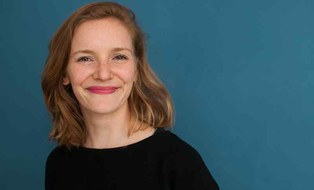Annika Konrad (PhD)
 © Annika Chantal Konrad
© Annika Chantal Konrad
Annika Chantal Konrad (PhD)
Send encrypted email via the SecureMail portal (for TUD external users only).
Visiting address:
Chair for Clinical Psychology and Behavioral Neuroscience, Room 308 Chemnitzer Str. 46
01187 Dresden
Office hours:
Office hours take place after previous registration via email.
Annika Konrad is research staff at the Chair of Clinical Psychology and Behavioral Neuroscience since September 2019. Her research focuses on changes in social-emotional and -cognitive processes (e.g., empathy) in individuals with affective disorders and PTSD or those at high risk. Among other methods, she uses functional magnetic resonance imaging (fMRI) to explore these processes at a neural level. She is also interested in how mindfulness-based approaches can help counteract these changes.
Academic experience
| Since 2019 | Research staff, Chair of Clinical Psychology and Behavioral Neuroscience, Technische Univeristät Dresden, Dresden, Germany |
| 2018-2019 | Traineeship, Department for Psychiatry, HELIOS Klinik, Pirna, Germany |
| 2017-2018 | Traineeship, Department for Psychosomatic Rehabilitation, MEDIAN Klinik Bad Gottleuba, Germany |
| 2016-2017 | Student research assistant, Chair of Behavioral Psychotherapy, Technische Univeristät Dresden, Dresden, Germany |
| 2015-2016 | Student research assistant, Chair of Behavioral Epidemiology, Technische Univeristät Dresden, Dresden, Germany |
| 2011-2014 | Student research assistant, Chair of Medical Psychology and Medical Sociology, Albert-Ludwigs-Universität Freiburg, Freiburg, Germany |
Education
| 2024 | PhD (Dr. rer. nat.), Chair of Clinical Psychology and Behavioral Neuroscience, Technische Univeristät Dresden, Dresden, Germany |
| 2022 | Licensed psychotherapist (Cognitive Behavioral Therapy) |
| 2017 | M. Sc. in Clinical Psychology and Psychotherapy, Technische Universität Dresden, Dresden, Germany |
| 2014 | B. Sc. in Psychology, Albert-Ludwigs-Universität Freiburg, Freiburg, Germany |
Honors and awards
| 2019-2022 | PhD scholarship, "Sächsisches Landesstipendium", granted by the Technische Universität Dresden |
Publications
2025
-
Neural correlates and plasticity of explicit emotion regulation following the experience of trauma, 2025, In: Frontiers in Neuroscience. 19, 1523035Electronic (full-text) versionResearch output: Contribution to journal > Short survey/Review
2024
-
Risk factors for internalizing symptoms: The influence of empathy, theory of mind, and negative thinking processes, 15 Feb 2024, In: Human brain mapping. 45(2024), 3, 19 p., e26576Electronic (full-text) versionResearch output: Contribution to journal > Research article
2023
-
Differential reduction of psychological distress by three different types of meditation-based mental training programs: A randomized clinical trial, 1 Oct 2023, In: International journal of clinical and health psychology. 23, 4, 9 p., 100388Electronic (full-text) versionResearch output: Contribution to journal > Research article
-
A multicenter feasibility study on implementing a brief mindful breathing exercise into regular university courses, 16 May 2023, In: Scientific reports. 13, 1, 14 p., 7908Electronic (full-text) versionResearch output: Contribution to journal > Research article
2022
-
Emotional Reactivity, Emotion Regulation, and Social Emotions in Affective Disorders, 14 Jul 2022, In: Zeitschrift für klinische Psychologie und Psychotherapie : Forschung und Praxis. 51, 1, p. 11-25, 15 p.Electronic (full-text) versionResearch output: Contribution to journal > Research article
-
Social Factors Predict Distress Development in Adults With Pre-existing Mental Disorders During the Coronavirus Disease 2019 Pandemic, 1 Jul 2022, In: Frontiers in psychology. 13, 849650Electronic (full-text) versionResearch output: Contribution to journal > Research article
2020
-
Evaluation of a brief cognitive behavioral group intervention to reduce depersonalization in students with high levels of trait test anxiety: a randomized controlled trial, May 2020, In: Anxiety, stress, and coping. 33, 3, p. 266-280, 15 p.Electronic (full-text) versionResearch output: Contribution to journal > Research article
2019
-
Die Cambridge Depersonalisation Scale-Situational (CDS-S) zur Erfassung von situationsabhängigem Depersonalisationserleben, 6 Jun 2019, In: Diagnostica. 65, 4, p. 243-252, 10 p.Electronic (full-text) versionResearch output: Contribution to journal > Research article
2018
-
Einfluss von Teamarbeit auf Wohlbefinden und emotionale Erschöpfung von Mitarbeitern in der medizinischen Rehabilitation, 1 Jan 2018, In: Das Gesundheitswesen : Sozialmedizin, Gesundheits-System-Forschung, medizinischer Dienst, public health, öffentlicher Gesundheitsdienst, Versorgungsforschung. 80, 3, p. 270-277, 8 p.Electronic (full-text) versionResearch output: Contribution to journal > Research article
2014
-
Patient perspectives of patient-centeredness in medical rehabilitation, 5 May 2014, In: Patient Education and Counseling. 96, 1, p. 98-105, 8 p.Electronic (full-text) versionResearch output: Contribution to journal > Research article
Online resources and profiles
@annikakonrad.bsky.social
